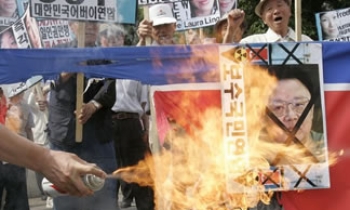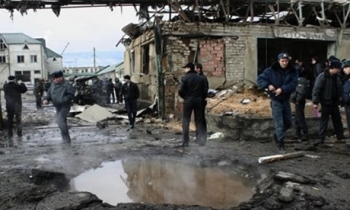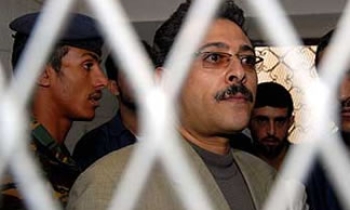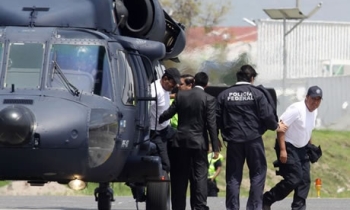Since the beginning of the war in Iraq in March 2003, more journalists have been killed in that country than anywhere else in the world. The situation faced by journalists attempting to cover the events in that country highlight the need for greater international efforts to protect journalists in conflict situations.
Journalists fulfil a special role in conflict situations, providing details of incidents that parties to the conflict would sometimes prefer remained unknown by the general public.
In the first year of the conflict, journalists were primarily killed by US or Iraqi forces, usually reported as having been caught in the crossfire or accidentally shot, though journalists' organisations have charged that some of the attacks looked like deliberate targeting. The International Federation of Journalists (IFJ) said on 8 March 2006, the third anniversary of the US attack on Baghdad’s Palestine Hotel, that more than 100 journalists and media staff have lost their lives.
"...In many of these cases we still do not have concrete answers to hard questions about who is responsible and what happened," said Aidan White, IFJ General Secretary.
In a recent case, the IFJ reports that Mahmoud Za'al, 35, a cameraman and reporter for the Iraqi television station Baghdad TV was shot on 24 January 2006 in Ramadi, while working on a social documentary. According to local reports, Mahmoud Za’al was allegedly shot in a cross-fire between US forces and insurgents.
Since 2004, however, both local and international journalists have increasingly been targeted by armed groups as part of their campaigns. Many local journalists are targeted because they work for foreign media and are accused of collaboration, while foreign journalists have been kidnapped and murdered in an attempt to put pressure on the foreign troops in the country.
Female journalists are among those targeted by armed groups. In February, a well-known correspondent for Al-Arabiya television and two members of her crew in Iraq were kidnapped and killed. Police found the bodies of reporter Atwar Bahjat, her cameraman Adnan Khairallah and soundman Khaled Mohsen on the outskirts of Samarra.
The IFJ has been campaigning for a similar level of protection as granted to humanitarian workers and UN staff in August 2003 to be extended to journalists in conflict situations. The organisation presented text for a suggested resolution of the Security Council to UN Secretary General, Kofi Annan, at the World Electronic Media Forum during the World Summit on the Information Society (WSIS) in Tunisian, 16 November, 2005.
Amnesty International (AI) agrees that international measures must be put in place to protect journalists in conflict. AI calls on the incoming members of the Security Council to adopt measures that seek to prevent these attacks and hold those who carry them out accountable for their actions.
However, it is not just in conflict situations that journalists need protection. Across the world, in a range of different situations, journalists are attacked, imprisoned and forced into self-censorship by repressive governments. The common element in all of these is the unwillingness of some governments to allow alternative voices to emerge and, in many cases, a fear that journalists will expose abuses they have tried to keep quiet.
In Uzbekistan, journalists who have tried to publicise the killings in Andizhan last May have been threatened, assaulted, detained and forcibly confined to their homes. The "war on terror" is used as a pretext for tightening restrictions on freedom of expression. The situation has become so bad that, following the closure of several independent foreign media outlets, the BBC closed its Uzbekistan office last October due to the increased harassment of its staff by the authorities.
The "war on terror" has also been invoked in Pakistan to restrict journalists. Journalists have been denied permission to cover events in the tribal areas of the country where the army is engaged in operations against those linked to al-Qa'ida and the Taleban. Across the country, journalists covering the "war on terror" have been harassed, arbitrarily arrested. Some have "disappeared" for some length of time.
In one such case, journalist Hayatullah Khan was abducted by armed men on his way to cover a protest rally in Mirali Bazaar, North Waziristan, against a missile attack four days earlier. He is now thought to be detained, possibly having been handed over to US agencies, but his detention has not been acknowledged and his whereabouts remain unknown.
In Colombia, the continuing armed conflict, which the government sometimes describes as a "fight against terrorism", has, in some cases been used as a pretext to intimidate journalists who, along with trade unionists and social activists, are targeted by both army-backed paramilitaries and the armed opposition groups.
Members of the security forces and government officials have sought to stigmatize some journalists who expose human rights violations by associating them with the armed opposition groups, thus placing them at risk of attack by paramilitary forces. They are under particular threat in the run-up to the Presidential elections on 28 May.
In Lebanon, following the assassination of former Prime Minister Rafiq al-Hariri in February 2005 and the subsequent withdrawal of Syrian troops, several prominent journalists who had spoken out against Syrian practices were killed or seriously injured by bombs placed under their cars. Samir Qasir and Gibran Tueni MP, a senior journalist with and the editor of the daily al-Nahar respectively, were killed in June and December 2005. May Chidiac, a presenter with LBC television, lost an arm and a leg in a bomb attack against her in September 2005.
Journalists in Kenya have also found themselves targeted in a pattern of increased intimidation and harassment by the government. In March this year, the Information and Communications Minister Mutahi Kagwe and Government Spokesman Alfred Mutua warned the media of stern government action if the persisted in what was described as "misreporting and misrepresentation".
In one of a series of incidents, two groups of hooded armed people with gas masks staged simultaneous raids early on 2 March on the editorial offices of the Kenya Television Network and the Standard Group's printing press in Nairobi. They disabled broadcasting equipment, burnt thousands of copies of newspapers and removed computer equipment.
States have a duty to protect journalists and not to persecute them in an effort to control the free flow of information. A free media is not only beneficial, but necessary in a free society. By exposing human rights abuses and giving voice to marginalised parts of the community, the media can at its best encourage the proper application of justice and stimulate debates that can defuse situations that might otherwise lead to conflict. When faced with unjust restrictions and the threat of attack, self-censorship in the media can have the opposite effect, aiding the covering up of abuses and fostering frustration in marginalised communities.
International recognition of the importance of journalists and the need for them to work free from unjust restrictions and the threat of violence will help to put pressure on those states who seek to control the media. Journalism matters and it is time for those who recognise the importance of a free media to try to change the minds of those who do not.









